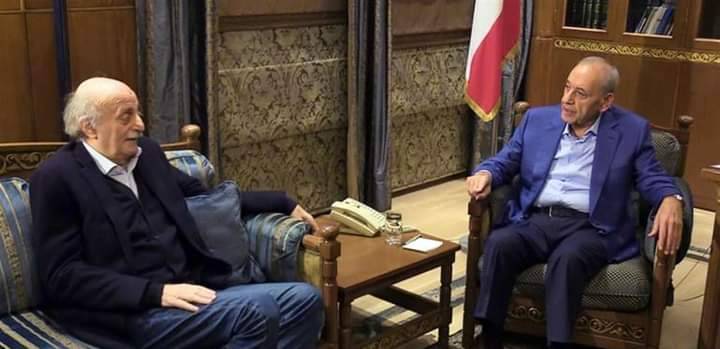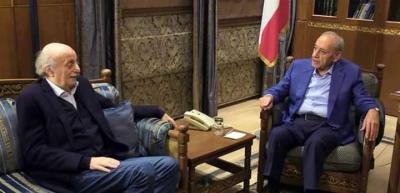Walid Jumblatt has shaken the political balance, making headlines and trending number one on social media. The leader of the Progressive Socialist Party has clearly changed his political stance, especially regarding Hezbollah, which he was trying to corner before the parliamentary elections. It is not an exaggeration to say that very few can understand Jumblatt, even those closest to him. However, it is certain that when Jumblatt alters his positions, we are likely facing a new "settlement" likely crafted by his long-time ally, President Nabih Berri.
In this context, political sources reveal that President Berri will be the "godfather" of the upcoming presidential election process. He opposed General Michel Aoun's transfer from Rabieh to Baabda Palace under the watchful eyes of Hezbollah, but this time Berri will not distance himself from the presidential file. Instead, his Ain el-Tineh will serve as the bridge for any Maronite figure aiming for the presidential palace. According to the sources, all indications point to Berri preparing to lead the political arena toward securing the election of a new president.
The party has repeatedly stated it has not yet discussed the presidential entitlements despite their impending nature. Berri's ally, Sleiman Frangieh, will not act except according to Berri's "tactics." The majority of independent Sunni MPs have a good relationship with President Berri, and Jumblatt is opening the door for direct dialogue with Hezbollah, certainly under Berri's sponsorship.
Reflecting on Jumblatt's recent positions, sources close to him indicate he is cautious about reaching internal confrontation with Hezbollah. He believes the Druze community will be on the front lines of any potential clash, hence he aims to avoid conflict between Druze and Hezbollah, or between Druze and Shiites. The sources note that Christians can escalate their positions without risking ground-level issues with Hezbollah and its supporters. Meanwhile, the Druze community always faces the risk of friction in various regions along the coastal line from Beirut to the south and in the western area of Aley, along the Beirut-Chatura road, and in Western Bekaa and Hasbaya in the south.
This demographic intermingling between Druze and Shiites leads Jumblatt to adopt non-aggressive diplomatic positions, despite his deep-seated objections to many of Hezbollah's policies. Therefore, he often engages in dialogue with Hezbollah, oscillating between criticism and conversation, always approaching it from the standpoint that he is different and will never become a part of the party's structure.
The sources clarify that Jumblatt’s concern for the Shiite community is similar to his concern for Christians; it centers on maintaining a minimum level of civil peace and preventing the Druze community from being drawn into conflict. Hence, we see him sticking to Christian-Druze reconciliation to the fullest extent, even accepting President Michel Aoun to avoid potential harm Aoun and his faction could inflict on Druze-Christian coexistence. On the other hand, he criticizes and opposes Hezbollah and will never be among its political friends, yet simultaneously, he keeps communication channels and dialogue open to avert friction between Druze and Shiites.
As for a solution, the same sources confirm that Jumblatt, like all Lebanese leaders, has no extraordinary information about the likelihood of an imminent resolution. The situation remains murky and unclear for all Lebanese leaders, and no one knows what will happen in the coming months.




